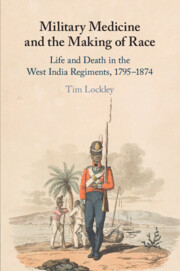Book contents
- Military Medicine and the Making of Race
- Military Medicine and the Making of Race
- Copyright page
- Dedication
- Contents
- Figures and Tables
- Acknowledgements
- Introduction
- 1 Medical Necessity and the Founding of the West India Regiments
- 2 The Ideal Soldier
- 3 The Use and Abuse of the Black Soldier
- 4 Statistics and the Reinterpretation of Black Bodies
- 5 Dehumanising the Black Soldier
- 6 Damage Done: The Asante Campaigns
- Conclusion
- Bibliography
- Index
2 - The Ideal Soldier
Published online by Cambridge University Press: 13 March 2020
- Military Medicine and the Making of Race
- Military Medicine and the Making of Race
- Copyright page
- Dedication
- Contents
- Figures and Tables
- Acknowledgements
- Introduction
- 1 Medical Necessity and the Founding of the West India Regiments
- 2 The Ideal Soldier
- 3 The Use and Abuse of the Black Soldier
- 4 Statistics and the Reinterpretation of Black Bodies
- 5 Dehumanising the Black Soldier
- 6 Damage Done: The Asante Campaigns
- Conclusion
- Bibliography
- Index
Summary
This chapter discusses the perception of commanders and surgeons of their black soldiers from 1795 to c. 1830. In an era so dominated by slavery, it is unusual to find so many positive reports about black men. Commanders generally thought them to be ideal soldiers – brave, committed and obedient, while their usefulness in battle was proved again and again. Even more important were the innate and permanent medical differences reported by regimental surgeons. Black skin, it was thought, afforded black soldiers special protection against tropical illness and healed far more rapidly than white skin, effectively functioning as a form of natural armour. The stamina and hardiness of West India Regiment soldiers enabled them to undertake marches in tropical heat without flagging. They also possessed hyper-attuned senses that made them ideal for tracking the enemy in difficult jungle terrain, more accurate with a rifle and better able to hear instructions conveyed via bugles and drums on the battlefield. By almost every measure commanders thought the West India Regiment soldier was an improvement on the white soldier, but the lasting legacy was a rich literature authored by army surgeons claiming that black and white bodies were fundamentally different.
- Type
- Chapter
- Information
- Military Medicine and the Making of RaceLife and Death in the West India Regiments, 1795–1874, pp. 54 - 83Publisher: Cambridge University PressPrint publication year: 2020

